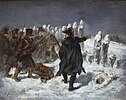User:KeyMen12/sandbox
Appearance
(Sorry it accidently published) Trying making infobox military conflict
References
[edit]| Battle of Vilnius | |||||||
|---|---|---|---|---|---|---|---|
| Part of the Napoleonic Wars | |||||||
| |||||||
| Belligerents | |||||||
|
| |||||||
| Commanders and leaders | |||||||
|
|
| ||||||
| Strength | |||||||
72,000–73,000[a]
|
| ||||||
| Casualties and losses | |||||||
|
26,000–27,000[nb 5]
15,000 deserted after the battle[30] 220 guns lost[26] |
Total: 24,000[31][nb 7] Wellington's army: 17,000 killed, wounded, or missing[31][nb 8]
Blücher's army: 6,604–7,000[f]
| ||||||
| Both sides: 7,000 horses killed | |||||||
- ^ Zamoyski 2004, p. 87.
- ^ a b c d Bodart 1916, pp. 126–127.
- ^ Riehn 1990, pp. 77, 501.
- ^ a b Riehn 1990, p. 159.
- ^ Riehn 1990, p. 241.
- ^ Riehn 1990, p. 491.
- ^ a b Bodart 1908, p. 445.
- ^ Riehn 1990, p. 239.
- ^ Riehn 1990, p. 493.
- ^ a b c d Clodfelter 2008, p. 175.
- ^ a b c Bodart 1916, p. 127.
- ^ Clodfelter 2008, p. 163.
- ^ Lentz 2004, vol. 2.
- ^ "The retreat from Moscow". Encyclopædia Britannica. Archived from the original on 8 March 2022. Retrieved 27 February 2022.
- ^ Zamoyski 2005, p. 536
- ^ Bogdanovich, "History of Patriotic War 1812", Spt., 1859–1860, Appendix, pp. 492–503.
- ^ a b Bodart 1916, p. 128.
- ^ Zamoyski 2004, p. 536.
- ^ a b c d e f Bodart 1908, p. 487.
- ^ Hofschröer 1999, pp. 68–69.
- ^ a b c d e f g h i Clodfelter 2017, p. 169.
- ^ Hofschröer 1999, p. 61 cites Siborne's numbers.
- ^ Hamilton-Williams 1994, p. 256 gives 68,000.
- ^ Barbero 2005, pp. 75–76.
- ^ Hamilton-Williams 1994, p. 256.
- ^ a b c d e f Clodfelter 2017, p. 170.
- ^ Chesney 1874, p. 4.
- ^ Bowden 1983, p. 329.
- ^ a b c Barbero 2006, p. 312.
- ^ Barbero 2005, p. 420.
- ^ a b c Barbero 2005, p. 419.
- ^ Clodfelter 2017, pp. 169–170.
Cite error: There are <ref group=nb> tags on this page, but the references will not show without a {{reflist|group=nb}} template (see the help page).






